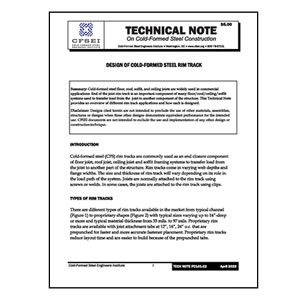NEW AND UPCOMING EVENTS

NEW AISI STANDARDS COURSE (EARN 8 PDHs)

FEBRUARY 12, 2026
POPULAR ON-DEMAND

Tech Note F602-20: Screw Connections with Other Materials or Gaps Between the Plies
Summary: Screws are the most common connection type for connecting cold-formed steel members to one another. It is also common for gaps to be provided between members in the form of other materials such as gypsum or insulation, but unfortunately, the current standards do not provide clear direction for the design of screwed connections with gaps in the material. This Tech Note will summarize available test data and propose design guidance based on the available test data.
Disclaimer: Designs cited herein are not intended to preclude the use of other materials, assemblies, structures or designs when these other designs demonstrate equivalent performance for the intended use. CFSEI documents are not intended to exclude the use and implementation of any other design or construction technique.

Tech Note L101-23: Design of Cold-Formed Steel Sheet and Wood Structural Panel Sheathed Shear Walls for Wind and Seismic Forces
Summary: This Technical Note provides an overview of low seismic and wind-controlled steel sheet and wood structural panel sheathed cold-formed steel (CFS) framed shear wall designs. It is a digest of the AISI D113-19, Cold-Formed Steel Shear Wall Design Guide and presents a more basic overview of design considerations. Sample shear wall capacity and loading comparisons are provided. For detailed design examples, refer to the AISI D113-19.
Code references are limited to AISI S240-15, North American Standard for Cold-Formed Steel Structural Framing; more detailed references, including AISI S400-15, North American Standard for Seismic Design of Cold-Formed Steel Structural Systems for high seismic design requirements can be found in the AISI D113-19.
Disclaimer: Designs cited herein are not intended to preclude the use of other materials, assemblies, structures or designs when these other designs demonstrate equivalent performance for the intended use. CFSEI documents are not intended to exclude the use and implementation of any other design or construction technique.

Webinar on Cold-Formed Steel Classroom: Connection Design 101
Continuing Education Credits Available – 1.5 PDH Credits
This webinar will review the fundamentals of cold-formed steel connection behavior and design. The primary focus will be on screw and weld connections; however, a limited discussion of bolt and power-actuated fastener (PAF) connections will also be provided. An overview of the design provisions in AISI S100, North American Specification for the Design of Cold-Formed Steel Structural Members will be included. In addition, design issues for typical cold-formed steel framing connections will be explored, including deflection track, stud-to-track, stud splice and cantilever knee wall connections. 
Presenter: Roger LaBoube, Ph.D., P.E.
Wei-Wen Yu Center for Cold-Formed Steel Structures
Roger LaBoube, Ph.D., P.E. is Curator’s Distinguished Teaching Professor Emeritus of Civil, Architectural and Environmental Engineering and Director of the Wei-Wen Yu Center for Cold-Formed Steel Structures at the Missouri University of Science & Technology (formerly University of Missouri-Rolla). Dr. LaBoube holds B.S., M.S., and Ph.D. degrees in Civil Engineering from the University of Missouri-Rolla. Dr. LaBoube has an extensive background in the design and behavior of cold-formed steel structures. His research and design activities have touched on many facets of cold-formed steel construction including cold-formed steel beams, panels, trusses, headers, and wall studs as well as bolt, weld, and screw connections. He is active in several professional organizations and societies, including membership on the American Iron and Steel Institute’s Committee on Specifications for the Design of Cold-Formed Steel Structural Members and chairman of the AISI Committee on Framing Standards. He is a registered Professional Engineer in Missouri.
In order to receive credit for this course, you must complete the quiz at the end and pass with at least 80% for a certificate to be generated automatically

Tech Note W601-23: Design Methodology for Hole Reinforcement of Cold-Formed Steel Compression Members
Summary: Cold-formed steel compression members, e.g., wall studs, are sometimes damaged inadvertently by other construction trades. An all-too-common damage is the cutting of large holes in either the flange or web elements of the cross section. In situations where the cross section of the cold-formed steel member has been compromised by the cutting of holes, the member must either be replaced or reinforced. This Tech Note discusses methodologies for engineering a reinforcement solution for a field cut hole in either the flange or the web element. The Tech Note presents a reinforcing concept to achieve the desired required strength of the section.
Disclaimer: Designs cited herein are not intended to preclude the use of other materials, assemblies, structures or designs when these other designs demonstrate equivalent performance for the intended use. CFSEI documents are not intended to exclude the use and implementation of any other design or construction technique.

Tech Note F102-21: Screw Fastener Selection For Cold-Formed Steel Frame Construction
This Technical Note updates and replaces CFSEI Tech Note F102-11
Summary: Specifying the proper fastener is necessary to assure the proper performance of the connections used in cold-formed steel construction. Cold-formed steel connections primarily utilize externally threaded fasteners, so embedment is not the controlling parameter. Instead, the design of the fastener along with the thickness of the steel govern the value of the connection. This Tech Note provides basic information for determining the appropriate screw type for various applications.
Disclaimer: Designs cited herein are not intended to preclude the use of other materials, assemblies, structures or designs when these other designs demonstrate equivalent performance for the intended use. CFSEI documents are not intended to exclude the use and implementation of any other design or construction technique.

Tech Note W400-23: Mechanical Bridging and Bridging Anchorage of Axially Loaded Cold-Formed Steel Studs
This Tech Note Updates and Replaces Tech Note W400-16
Summary: The purpose of this technical note is to provide a clear understanding of the design requirements and methods to laterally brace (bridge) axially loaded cold-formed steel stud walls.
Disclaimer: Designs cited herein are not intended to preclude the use of other materials, assemblies, structures or designs when these other designs demonstrate equivalent performance for the intended use. CFSEI documents are not intended to exclude the use and implementation of any other design or construction technique.
